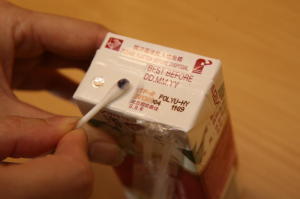Ink aims to “enhance product authenticity and traceability” of various fast-moving consumer goods.Science Daily reports that the Anti-Erasing (ATE) ink was developed by researchers at the Hong Kong Polytechnic University’s (PolyU) Department of Applied Biology and Chemical Technology for use in “fast-moving” consumer goods such as food, drink and drug packaging to help identify counterfeit products.
The article explains that product markings are often tampered with and are “easily altered by simple procedures” to make them easier to illegally resell. The ATE ink, which has been in development since 2011, therefore tackles this issue as it leaves “irremovable trace marks” which make it easier for consumers to detect tampered or fraudulent goods and allow for products to be tracked along the supply chain.
The ATE ink is a “fast-drying formulation” compatible with a number of continuous inkjet printers, and can be printed on different packaging materials in a selection of ink colours. In China, three patent applications have been filed for developing ATE inks, with production being “scaled up for commercialisation” through Hallyuen Holding Limited, which commissioned the research and development of the ink.
Professor Pei Li, who led the research team at PolyU, said: “With the adoption of ATE Ink, product manufacturers now have an effective tool to combat counterfeit and tampered products that could result in disastrous impact on its operations and goodwill. More importantly for the society, consumers can rest assured that their purchased food and beverage products are safe as the expiry dates on them are genuine.”
The Recycler has reported on a number of newly developed anti-counterfeiting technologies, including Swiss researchers’ method of “miniaturised” authentication; Nanotech Security’s KolourOptik technology; and a consumable security chip developed by Marvell.

